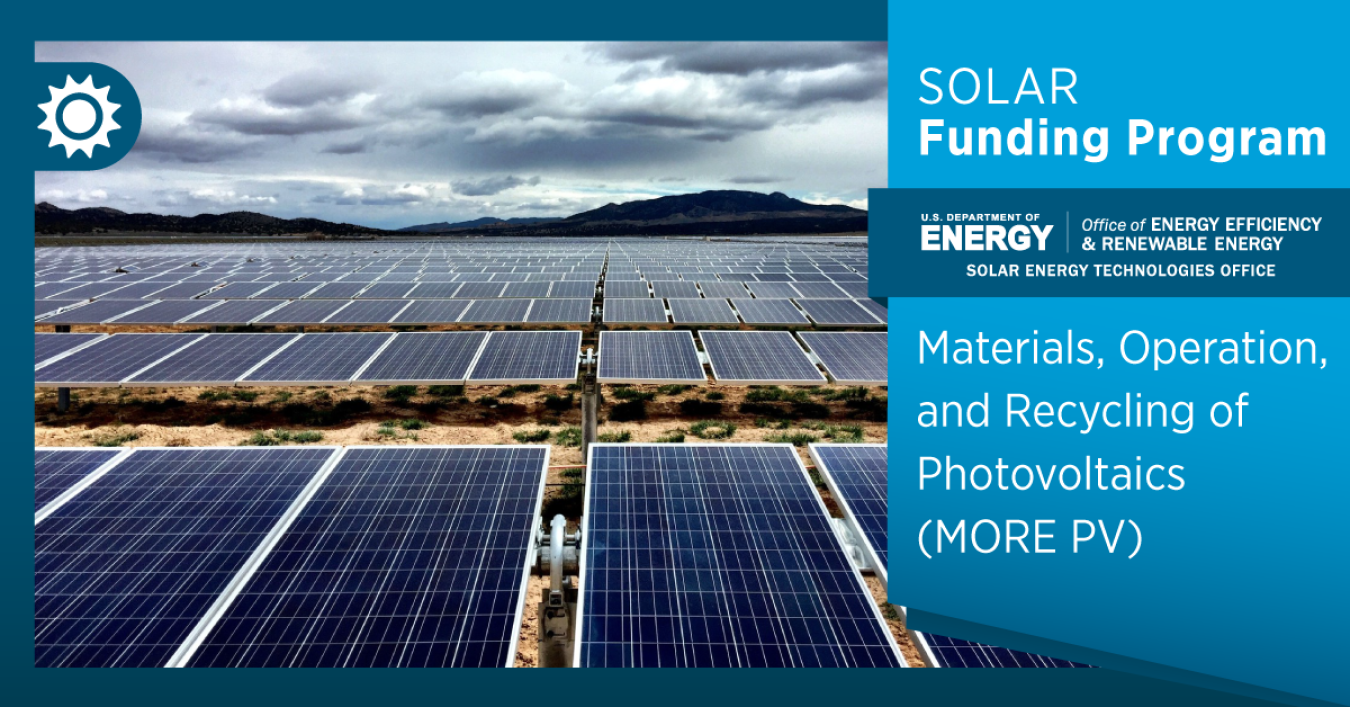
Improving Practices
Register for the PV End-of-Life Action Plan Update webinar on October 21 at 2 p.m. ET
The U.S. Department of Energy (DOE) Solar Energy Technologies Office (SETO) Materials, Operation, and Recycling of Photovoltaics (MORE PV) funding program supports research and development projects to create innovative and practical approaches to increase the reuse and recycling of solar energy technologies.
DOE announced this funding opportunity on July 21, 2023. SETO selected four projects to receive $15.7 million in funding, which were announced on September 12, 2024.
Approach
Projects will address challenges associated with the rapid deployment of PV systems in the United States, including the increasing demands on PV materials, system operation and maintenance, and recycling. This work will support technology improvements to reduce these challenges with a holistic view of all stages of the PV lifecycle—from the material needs and installation to operation and end of life.
Objectives
The research activities will strengthen a circular economy for solar energy systems in the United States, aligning with the Biden-Harris Administration’s goals to build a clean and equitable energy economy. This funding program also supports DOE’s Photovoltaics End-of-Life Action Plan which aims to halve the cost of recycling by 2030 and reduce the environmental impact of solar energy modules at end-of-life.
Selectees
- Award and cost share amounts are subject to change pending negotiations –
Topic Area 1:
Case Western Reserve University
Project Name: ArgoPV: Orchestrating the Complete Photovoltaic Lifecycle Using Generative Artificial Intelligence and Spatiotemporal Graphs
Location: Cleveland, OH
DOE Award Amount: $4 million
Awardee Cost Share: $150,000
Principal Investigator: Roger French
Project Description: This project is developing ArgoPV, a generative artificial-intelligence–powered tool that can be used for photovoltaic (PV) design and operation decision support to minimize energy use, costs, and environmental impacts. To enable this tool, the project will build a holistic framework using PV performance and weather data throughout the system’s lifecycle (PV materials, design, installation, performance, and end-of-life) and advanced machine learning and artificial intelligence analytics to enable prediction of future performance. The team is partnering with the University of Central Florida and Sandia National Laboratories.
kWh Analytics
Project Name: Raising the Bar: Data-Driven Standards to Increase and Incentivize PV Resiliency
Location: Sacramento, CA
DOE Award Amount: $2.4 million
Awardee Cost Share: $600,000
Principal Investigator: Adam Shinn
Project Description: The study of solar resilience during extreme weather events, like hail and hurricanes, has historically been limited by the lack of data. Leveraging physical loss data from solar assets and insurance claims, kWh Analytics is building a risk assessment model to identify the leading characteristics that make PV systems resilient against loss. Through a partnership with the National Renewable Energy Laboratory, Det Norske Veritas Group (DNV), and STANCE: Renewable Risk Partners, this analysis will provide standards and actionable insights to improve resilience for PV system owners and operators and to incentivize efficient solar deployment at scale for lenders.
University of North Carolina at Charlotte
Project Name: Contactless Multi-Curve Tracer for Enhanced Photovoltaic System Installation, Operations, Maintenance and Performance
Location: Charlotte, NC
DOE Award Amount: $1.3 million
Awardee Cost Share: $66,000
Principal Investigator: Jaewon Oh
Project Description: This project,in partnership with Portland State University, Pordis LLC, SOLV Energy, Arizona State University, and Duke Energy, is developing a commercially viable contactless multi-current-voltage (I-V) curve tracer. This tool will measure the current and voltage output of photovoltaic (PV) modules at multiple points without disconnecting and reconnecting the system to evaluate performance during its operation. This technology could make assessing PV system performance and diagnosing problems safer and faster for U.S. PV installers and operations and maintenance professionals.
Topic Area 2:
Electric Power Research Institute
Project Title: Breaking Barriers to Enable Solar Technology Circularity (BBEST Circularity)
Location: Palo Alto, CA
DOE Award Amount: $8 million
Awardee Cost Share: $2 million
Principal Investigator: Cara Libby
Project Description: This partnership of about 30 organizations, including academic and industrial stakeholders, aims to improve the circularity and lifecycle impact of photovoltaic (PV) systems through technology solutions, strategic partnerships, and community benefits. These include enabling near-field or in-field PV system repair, evaluating end-market technology solutions, reviewing policies that incentivize or mandate PV recycling, analyzing PV module composition and toxicity, developing end-of-life best practices, and publishing an end-of-life database to support long-term planning. The partnership will also establish working groups to guide research and analysis, support standards development, inform policy discussions, and disseminate results.
Learn more about SETO’s photovoltaics research, funding programs, and open funding opportunities.

